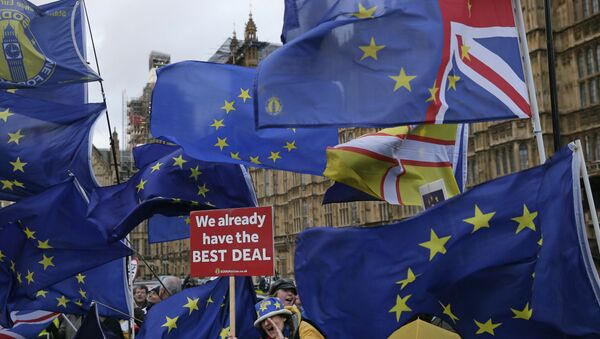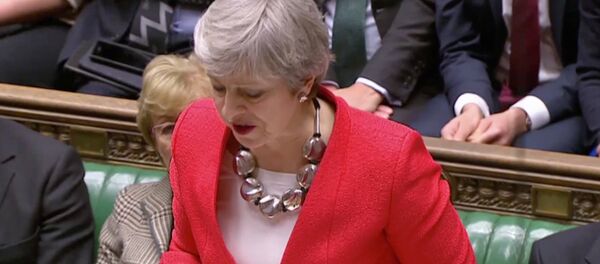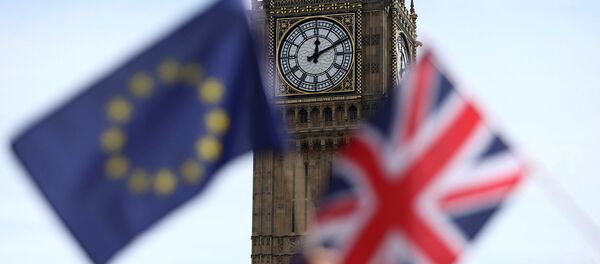According to a recent study by Bertelsmann Stiftung foundation, a no-deal Brexit could cost Germany up to €10 billion per year. The study suggests that the Europeans, without Great Britain, would have to suffer revenue losses of €40 billion per year in a hard Brexit. This no-deal Brexit would hit the British themselves the hardest, while Germany will face the second highest loss in the European Union. At the same time, the study showed that the United States and China might benefit from Brexit.
Sputnik: A new study shows that the EU nations' incomes will be severely hit by the UK break away from the bloc without a deal. Bearing this in mind, why can't Brussels negotiate a deal with London that would pass the Parliament as to avoid the negative impact of this outcome? I suppose it's no surprise seeing another study that's negative; what's your particular take on this?
Huw Edwards: A hard Brexit is going to hit everybody. And you've got to distinguish between the long-term costs, which are not good by any means, and the short-term costs because I think there is a lack of preparation on all sides. Regarding the absolute amount, obviously, the UK would be hit more than anyone else, certainly relative to the size, our economy would be hit a lot more than anyone else. So, though the study seems to focus on the costs to Germany, I dare say because of their specialists, really of the EU economies ones who would be most worried I'd say would be Ireland and possibly Belgium. The Belgians are certainly very worried, they don't think their ports could cope with a disorderly Brexit.
Huw Edwards: Obviously, it will cost them [Germany], but you've got to bear in mind the calculations from the European side which, in a sense the EU sees itself as a club and they can't be seen to give better terms to someone leaving a club, someone outside a club, than they can do to insider members. And that is the bottom line because they don't want the whole project to unravel. So, people knew that before the referendum, and I think the Leave campaign were very dishonest in the way they sold it as they deceived themselves; David Davis was saying "what an easy job it would be doing a deal with the Europeans." It isn't because a deal which threatens to unravel the whole of the European Union is never going to be offered.
Sputnik: I think your words "a deal that's going to unravel the European Union" are probably going to be the key statement really; and this is where we are in this mess, in this malaise, I suppose…
Huw Edwards: I suppose so. I mean, it's really hard to know; Theresa May is still gambling, I think, that the deal that she has got does have a fair chance of passing. It has to be said that the Irish have played their hand very hard; I mean, although they are one of the countries themselves that'd be hit hardest by a disorderly Brexit, the Irish have played a very hard game. And remember that they have a veto in Brussels. And Ireland does not want to be seen to do anything which reinstates a hard border between the Irish Republic and the North. At the same time, obviously, the UK has a problem because the government is very dependent on the DUP [Democratic Unionist Party]. So, it is Ireland that is the key bloc here I think.
Sputnik: I think, obviously, from an Irish point of view, it's very important because of the alignment that we've got with the United Kingdom. Let me just ask you specifically about Germany and France though because it's quite important for our global listeners. Germany and France will wind up among those most severely hit by a hard Brexit; what could Berlin and Paris do to avoid those negative impacts?
Huw Edwards: They could possibly soften their stance on the Irish border. It may well be that they could provide more assurances there. But when you consider the size of the economies of Germany and France, they could take this hit; it is the smaller countries like Ireland and Belgium that actually are more worried I would have said, and the UK.
Huw Edwards: I'm not sure how glad the Germans and the French would be to have the British back at the table inside the EU, let alone participating in the European elections. On the other hand, I think within Brussels they might want it; but at the same time there probably is an acceptance that the UK is likely to be leaving and they are likely to be leaving with some sort of deal, that would be better than leaving with no deal. But they would feel, I suppose, they can't be seen to be too accommodating, particularly given the European Research Group (ERG) have been I would say completely unreasonable in the way they are handling this. The problem that Brussels I think have slightly shot themselves in the thoughts because I would have said that the Parliament's threat to effectively block no-deal would actually be one thing that probably would bring the ERG on side, or many of them, to support Theresa May's deal. By the Europeans now saying "deal has to be agreed before we get an extension" they may inadvertently have been putting no-deal back on the table, and that actually weakens Theresa May's position.
The views and opinions expressed by the speakers do not necessarily reflect those of Sputnik.



